 “I couldn’t say the word ‘rape’ for a long time,” said Larisa Storisteanu, a volunteer with the Clothesline Project (CLP) at Ryerson, which took place from May 1 to 4.
“I couldn’t say the word ‘rape’ for a long time,” said Larisa Storisteanu, a volunteer with the Clothesline Project (CLP) at Ryerson, which took place from May 1 to 4.Hosted by the V-Day group at Ryerson, the project allowed women who have experienced abuse to share their stories, emotions and messages of hope on donated t-shirts. The t-shirts were then displayed publicly. According to the CLP, making and hanging that laundry can be part of the healing process.
 Storisteanu, a former part-time visual arts student at Ryerson, first heard about CLP a few years ago. She was raped by a former employer and wanted to participate in an event she felt was a positive way of reconciling her experience with violence. Storisteanu is also assistant director of Canadian Artists Against Sexual Assault, a student group that has raised funds for the Toronto Rape Crisis Centre by auctioning artwork created by women who have survived violence.
Storisteanu, a former part-time visual arts student at Ryerson, first heard about CLP a few years ago. She was raped by a former employer and wanted to participate in an event she felt was a positive way of reconciling her experience with violence. Storisteanu is also assistant director of Canadian Artists Against Sexual Assault, a student group that has raised funds for the Toronto Rape Crisis Centre by auctioning artwork created by women who have survived violence.“It’s definitely hard opening up about it but its harder keeping silent,” she said, sitting beside the growing clothesline, her mint colour eyes emphasized by wavy auburn hair.
Decorated t-shirts were strung between four trees alongside Kerr Hall South as women sat at tables and sketched out stories with markers. Traffic on the sidewalk stopped to converse with volunteers about the workshop and across the street more shirts swung in the breeze beside Lake Devo.
 The first CLP event took place in 1990 as part of the “Take Back the Night” march and rally in Massachusetts. The founding group felt that hanging laundry, long seen as women’s work, would be a natural medium to express provocative, educational and constructive art. The project has now spread worldwide.
The first CLP event took place in 1990 as part of the “Take Back the Night” march and rally in Massachusetts. The founding group felt that hanging laundry, long seen as women’s work, would be a natural medium to express provocative, educational and constructive art. The project has now spread worldwide.Virginia and Ashley Tran, who started V-Day at Ryerson, chose to organize CLP as a way of providing a supportive, artistic and activist workshop for the Ryerson community. In partnership with Ryerson’s Women’s Centre, they started collecting donated shirts for the clothesline in December.
Virginia, a freelance artist better known as “V”, sat beside the growing clothesline in a billowy white shirt and silver hoop earrings. She said that many women who participated or approached the tables of t-shirts had stories to tell, and V-Day volunteers were there to listen. One woman’s story stood out for Tran: “A lot of times women don’t know it’s abuse until it’s too late.”
One woman’s story stood out for Tran: “A lot of times women don’t know it’s abuse until it’s too late.”
For many women, name-calling by partners can seem like a silly or insignificant reaction. “It’s about noticing and identifying the early stages of it, and how it escalates into an abusive situation,” said Tran, who has experienced violence with men in the past.
“Not only are we acknowledging the victims, but we’re building them up as well,” said project coordinator Rehana Hirjee, in grey tights and jean shorts, who sat alongside the clothesline with Tran.
 She feels that women lack the outlets to express their experiences with violence and can remain silent out of fear that an abusive significant other will discover their disclosure. The Clothesline provides a safe place to tell those stories.
She feels that women lack the outlets to express their experiences with violence and can remain silent out of fear that an abusive significant other will discover their disclosure. The Clothesline provides a safe place to tell those stories.
 One woman’s story stood out for Tran: “A lot of times women don’t know it’s abuse until it’s too late.”
One woman’s story stood out for Tran: “A lot of times women don’t know it’s abuse until it’s too late.”For many women, name-calling by partners can seem like a silly or insignificant reaction. “It’s about noticing and identifying the early stages of it, and how it escalates into an abusive situation,” said Tran, who has experienced violence with men in the past.
“Not only are we acknowledging the victims, but we’re building them up as well,” said project coordinator Rehana Hirjee, in grey tights and jean shorts, who sat alongside the clothesline with Tran.
 She feels that women lack the outlets to express their experiences with violence and can remain silent out of fear that an abusive significant other will discover their disclosure. The Clothesline provides a safe place to tell those stories.
She feels that women lack the outlets to express their experiences with violence and can remain silent out of fear that an abusive significant other will discover their disclosure. The Clothesline provides a safe place to tell those stories.“It’s a silent protest, I think. Once you read it, it has such an impact,” said Hirjee, with long dark curls framing her face.
Each shirt was colour-coded to symbolize the form of abuse and whether the victim survived.
“He spat on my face and he hit me…he called me a bitch and he kicked me…one black eye and a bleeding head…I vow never to go back and not to listen to what he says,” read a lime green shirt, representing a survivor of incest and sexual abuse, which hung near Lake Devo.
“He spat on my face and he hit me…he called me a bitch and he kicked me…one black eye and a bleeding head…I vow never to go back and not to listen to what he says,” read a lime green shirt, representing a survivor of incest and sexual abuse, which hung near Lake Devo.
 But women aren’t the only survivors of violence. Earlier in the afternoon a man who had been abused by two of his former wives asked Hirjee if there was room for men who were victims. “Why not?” replied Hirjee.
But women aren’t the only survivors of violence. Earlier in the afternoon a man who had been abused by two of his former wives asked Hirjee if there was room for men who were victims. “Why not?” replied Hirjee.“I want men to know, ‘listen we’re in this together,’” said Tran, her hair pulled back in a low ponytail. “V-day isn’t a pro-woman, anti-men group. We’re pro-human.”
Jeff Perera, a social work student currently organizing Ryerson’s White Ribbon Campaign (RWRC), came out to support the CLP workshop on Saturday, and hopes to work with V-Day in the future. The RWRC is an organization of students, staff and faculty dedicated to ending men’s violence against women through awareness and education.Perera’s aim is to create a space for Ryerson’s male population to discuss its role in violence without blaming. “It’s not the ‘oppressor, you are the enemy’ discussion. Let’s find how we can be part of the solution,” says Perera.
Perera’s mother was a victim of violence. He believes that remaining silent about the issue allows it to fester and grow. “You’re part of the problem or part of the solution,” he says.
 V-Day also sold “I (heart) vagina” t-shirts and buttons and received donations for future campaigns, as well as for the Metropolitan Action Committee on Violence Against Women and Children, an organization that provides community education, justice and safety programs.None of the stories that were written on shirts will be lost, said Tran.
V-Day also sold “I (heart) vagina” t-shirts and buttons and received donations for future campaigns, as well as for the Metropolitan Action Committee on Violence Against Women and Children, an organization that provides community education, justice and safety programs.None of the stories that were written on shirts will be lost, said Tran. V-day intends to hold another CLP on campus in September and will reuse shirts created during their first workshop. She wants to spread the message that anyone can start a CLP, and hopes to collaborate with other projects across Toronto.
 Wearing a long, patchwork skirt, with a feather tied in her hair, Storisteanu sat beside the red t-shirt that she decorated the previous day, which symbolized rape.
Wearing a long, patchwork skirt, with a feather tied in her hair, Storisteanu sat beside the red t-shirt that she decorated the previous day, which symbolized rape.
“We essentially want the CLP to be a Toronto collective that started here at Ryerson, and that’s beautiful. So we’re calling out to people,” says Tran.
 Wearing a long, patchwork skirt, with a feather tied in her hair, Storisteanu sat beside the red t-shirt that she decorated the previous day, which symbolized rape.
Wearing a long, patchwork skirt, with a feather tied in her hair, Storisteanu sat beside the red t-shirt that she decorated the previous day, which symbolized rape.“It is still a beautiful world. Be cheerful. Strive to be happy,” the shirt read, which came from the poem “Desiderata” by Max Ehrmann, surrounded by a circular design that branched off into curls. Underneath were the words, “I’m working on forgiving you…slowly…taking it day by day.”
Although she feels that many things have contributed to her healing process, Storisteanu says that witnessing the messages of other women was empowering for her. She knows that voicing what she went through potentially helped someone else.
“It doesn’t make you feel so anonymous, sharing your story.”
*Published in the June issue of The Ryerson Free Press






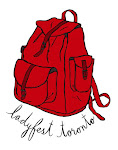


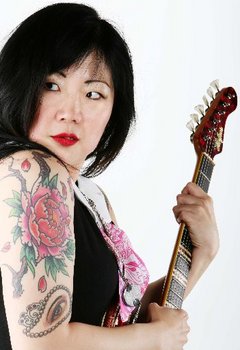





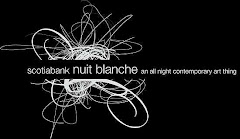

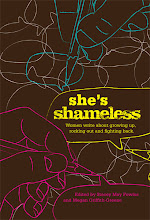
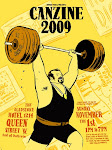






1 comment:
This scumbag sleeps with married men and then acts like a victim in the chaos she created.
Post a Comment